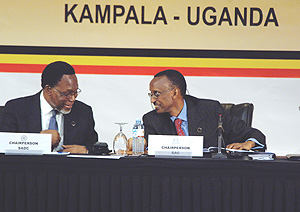• Leaders commit to integration KAMPALA - President Paul Kagame has said the first regional tripartite summit was a chance to remind African leaders that they needed to do more and faster so as to enhance and benefit from integration. This was during the official opening of the first Common Market of Eastern and Southern Africa (COMESA), the East African Community (EAC) and the Southern African Development Community (SADC) Tripartite Summit of Heads of State held in Kampala , Uganda Wednesday.


• Leaders commit to integration
KAMPALA - President Paul Kagame has said the first regional tripartite summit was a chance to remind African leaders that they needed to do more and faster so as to enhance and benefit from integration.
This was during the official opening of the first Common Market of Eastern and Southern Africa (COMESA), the East African Community (EAC) and the Southern African Development Community (SADC) Tripartite Summit of Heads of State held in Kampala , Uganda Wednesday.
The main purpose of the historic high-level summit was to provide a platform for the three regional groupings to discuss and make decisions on areas that enhance integration, amongst others.
"This summit constitutes another chance to remind ourselves that we need to do more and faster, especially with regard to improving trade within and across our regions, building requisite first-rate economic infrastructure, and establishing effective institutions to support these imperatives,” he said, shortly after commending the tripartite task force and the three blocs’ secretariats for "ably leading this exercise from its inception to this important milestone.”
Kagame, who is also the EAC Chairperson, expressed faith that the summit would lead to achievable and time-bound action plans for increased collaboration, productivity, and prosperity in the three regions and beyond.
"We are gathered here in a time of considerable uncertainty in the global economy, when the implications of the crisis in the international financial markets on our continent, have yet to unfold,” he said.
"It is also important that we take stock of the challenges that have up to now undermined African integration efforts,” he said, pointing to the issues of multiple and overlapping memberships, which he said were also on the summit’s agenda.
"Related to this challenge is the issue of not enforcing protocols and treaties that we rightly adopt, with the understanding that regional integration is far superior to the existing small and fragmented markets, and a proven pathway to greater prosperity.”
"We know the effect of non-tariff barriers in hindering the expansion of trade – removing these obstacles does not necessarily require a great deal of financial resources, but political will,” he reiterated, adding that weak regional infrastructure resulting from the inability to suitably confront this handicap is another recurring difficulty.
Kagame however, acknowledged that it is inevitable that integration will initially produce losers and winners, a consequence of a number of factors, including differences in productivity and economic strengths of individual economies.
"That is why successful integration processes incorporate compensation mechanisms to provide the least prepared states with lead time to execute mitigating strategies against initial shocks.”
The event also attended by other regional Heads of State, including the host – President Yoweri Museveni of Uganda, Tanzania’s Jakaya Kikwete, Kenya’s Mwai Kibaki, South Africa’s Kgalema Motlanthe and Zimbabwe’s Robert Mugabe, saw leaders come out to commit to integration in seemingly unprecedented terms.
President Museveni said it was a historic meeting because the greatest enemy and weakness of Africa , has been disunity and a low level of political and economic integration.
"That is why Africa suffered from the nightmare of slavery for 300 years. In my opinion, the greatest cause for Africa’s woes has been a low level of, especially, political integration.”
Integration is a strategic tool for a cluster of linked peoples, using a big market, in order to ensure their future safety and prosperity, he stressed.
SADC Chairperson, South Africa’s President Kgalema Motlanthe, underscored that regional integration is a central component of the blocs’ development in an increasingly globalised world economy.
"SADC believes the time has come for COMESA, EAC and SADC to bring together our respective regional integration programs in order to further enlarge our markets, unlock our productive potential, increase the levels of intra-Africa trade and enhance our development prospects.
"The process we launch today will place us in a stronger position to respond effectively to intensifying global economic competition and will begin to overcome the challenges posed by multiple memberships of regional organizations.”
"Our strength lies in our unity and constitutes a formidable force for the achievement of our collective objectives,” he said and urged others to take the necessary decisions to work systematically and with determination to establish a single free trade area.
The final communiqué of the heads of state and government read by Amb. Juma Mwapachu sealed their commitment, to the day’s deliberations.
He pointed out that the summit agreed on a programme to harmonize trading arrangementsamongst the three blocs, free movement of business persons, joint implementation of inter-regional infrastructure programmes as well as institutional arrangements on the basis of which the three REC’s would foster cooperation.
It underscored the fact that the tripartite arrangement is a crucial building bloc towards achieving the African Economic Community.
Ends


